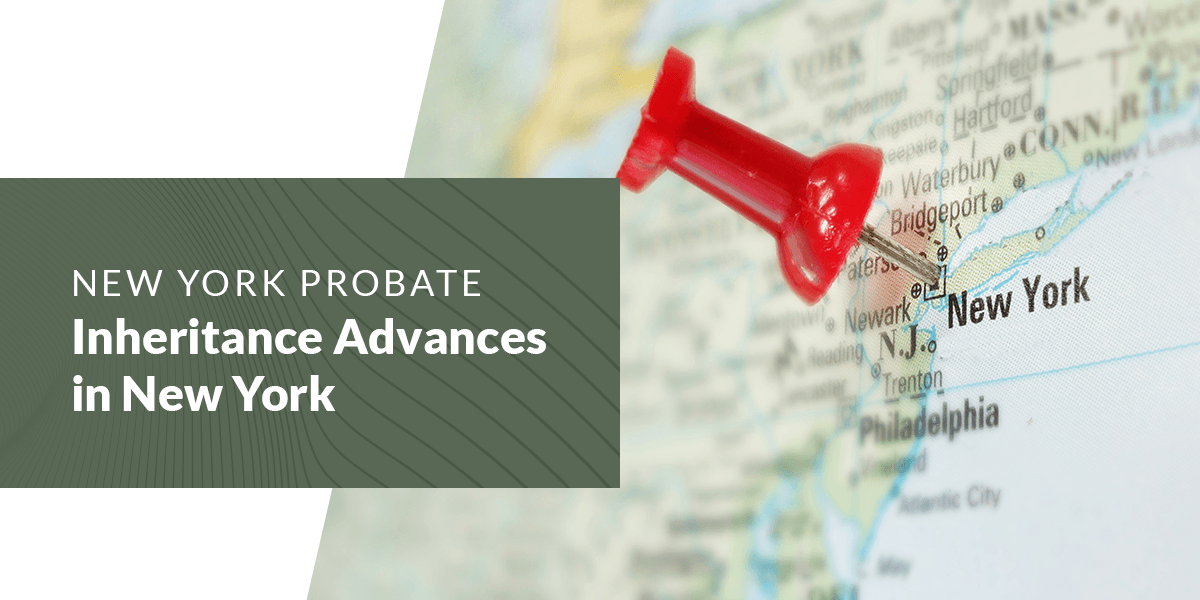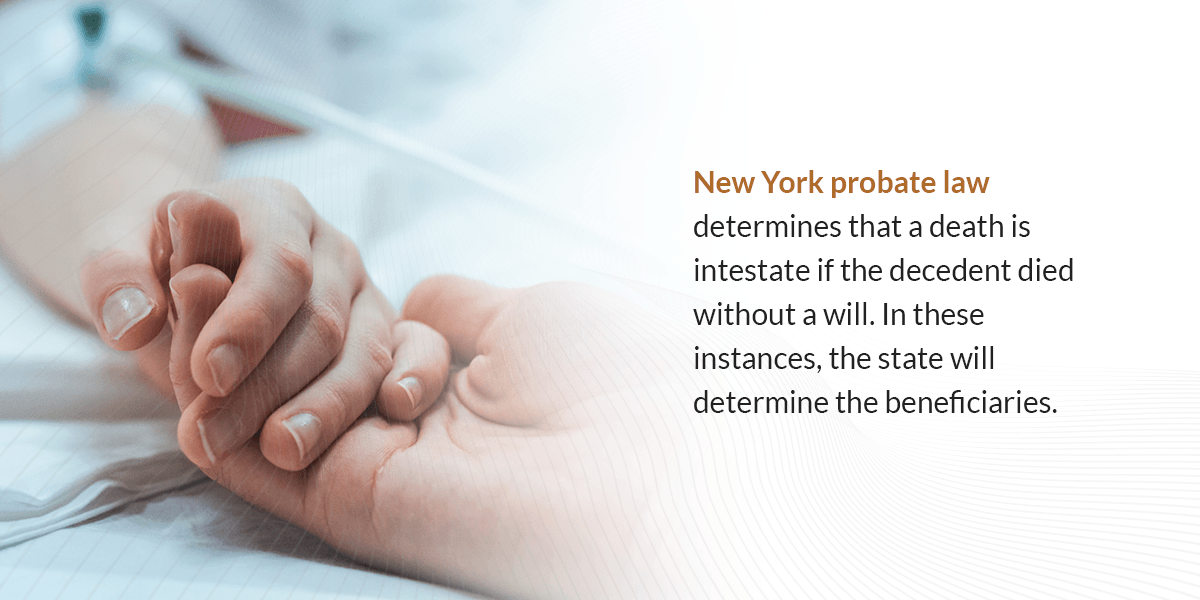New York Probate | Inheritance Advances in New York
Probate Process in New York
When a New York resident dies, New York probate law dictates how their assets are distributed to heirs and beneficiaries. The New York probate courts first appoint a representative, also called an executor, to handle the estate. The executor will collect and document all assets, pay off outstanding debts and determine whether any wills are valid. Once all parties have completed every required step, the rightful heirs receive their inheritance money.
Is Probate Required in New York?
New York probate law requires most estates to go through the process. However, only individually owned assets like houses, cars, checking accounts, jewelry, cash and electronics must go through the probate process. Life insurance policies and bank accounts with a named beneficiary and jointly owned assets do not have to go through the New York probate process. Further, estates placed in a living trust are non-probate assets.
Jointly owned estates with a value less than $50,000 may qualify for a Voluntary Administration proceeding for small estates, regardless of whether the deceased has a will. Administration refers to how a court authorizes an heir to handle a decedent’s property.
If a deceased owned real estate in only their name, you can’t file for a Voluntary Administration proceeding. Further, if the decedent had both real estate and a will, heirs will have to file for a probate proceeding. In the case of a wrongful death lawsuit, an estate should also go through the probate process.
What Are the Steps to Settling an Estate in New York?
If probable is necessary, the steps in the process include:
- Petition filing: The executor can initiate probate by filing the appropriate documentation in the Surrogate’s Court in the county where the decedent resided. These documents should include the probate petition, a certified copy of the death certificate and other required paperwork.
- Giving notice: The executor should mail a notice of the probate proceedings to all the appropriate parties, including creditors, heirs and beneficiaries.
- Inventorying the property: Conduct an inventory of everything the decedent owned, including real property like land and houses and personal property such as jewelry, automobiles and investment products.
- Paying debts: The next step involves repaying any debts accumulated by the decedent. Examples include home mortgage loans, car notes and credit card balances. The executor must also pay any remaining income or property taxes. It may be necessary to sell the decedent’s assets to resolve these obligations before distributing the inheritance to heirs or beneficiaries.
- Distributing the remaining property: The final probate step in New York is disbursing the assets to the distributees listed in the probate petition. These individuals will receive a citation requiring them to report to the appropriate Surrogate’s Court jurisdiction.
How Long Does Probate Take in New York?
The New York probate process length depends on the size of the estate, number of beneficiaries, the executor’s abilities and whether the will is contested. While some heirs may receive their inheritance in as little as six months, the probate process typically lasts about one year for most estates. Usually, probate will be shorter if the will is not contested and debts are quickly resolved. But more complex cases, like in the instance of a dispute, can take several years.
Typical situations that cause probate delays in New York include:
- Estate complexity: Not all probate situations are straightforward. For example, if the estate contains multiple properties, investments or businesses, the process will likely require more time and resources.
- Disputes: Disagreements between heirs or beneficiaries can create substantial probate delays. Sometimes, resolving the issues takes litigation or mediation, which can substantially lengthen the timeline.
- Existence of a will: The process typically goes faster and more smoothly if the decedent leaves a detailed will with clear instructions for distributing property and assets.
- Court backlog: A full court docket could prevent probate from moving forward.
How Long Do You Have to File Probate After Death in New York?
The law has no set deadline for filing probate after death. But you’ll want to file probate as soon as possible, as the process can take several months to a year.
The following is a general New York probate timeline:
- Three months: The executor or a probate attorney will file a copy of the death certificate, will and probate petition with the New York Surrogate’s Court. Then, the court issues letters of administration, allowing the executor to act for the estate. The executor will create an asset inventory and notify creditors of the deceased’s death. Finally, property must be appraised, sold to creditors or distributed to heirs.
- Six months: By the sixth month, the executor must ensure creditors are paid, resolve disputes and file Federal Income Tax return forms 1040 and 1041.
- Nine months: In an ideal case, the court should distribute benefits to heirs, discharge the personal representative and close the estate. However, challenges such as will contests, creditor litigations and a larger estate may lengthen the process. The New York state estate tax is also due after nine months of the decedent’s death.
How Much Does Probate Cost in New York?
The estate’s value is a determining factor regarding the cost of the New York process. For estates under $10,000, the court assesses a fee rate of $45. The cost escalates via a tiered schedule, reaching a maximum of $1,250 for estates valued at $500,000 and above.
There are also specific fixed fees for filing a petition to initiate certain proceedings, which can range from $10 to $75. Examples include filing a will or suspending a fiduciary.
Besides court costs, the estate will likely need to pay attorneys to help navigate the probate process. These fees typically range from $3,000 to $3,500 to have the will admitted for probate. These expenses will likely increase if an individual or entity contests the will or challenges the appointment of the executor. The inability to locate the decedent’s next of kin can also cause delays and additional fees.
How Do You Avoid Probate in New York?
Heirs cannot access the money from their loved ones during the long, expensive probate process. Therefore, many people seek ways to avoid probate and receive their inheritance faster. If you’re seeking to get your money faster, a probate advance helps you receive your inheritance right away. There are also other ways estates can avoid the probate process altogether for some assets.
If a deceased individual included their estate in a living trust with a named beneficiary, this successor could receive the entire estate while avoiding probate. Assets with a named beneficiary and those jointly owned can also bypass probate.
What Happens if Someone Dies Without a Will in New York?
A will dictates an executor to carry out the deceased’s wishes and indicates trusted guardians to care for dependents like small children. New York probate law determines that a death is intestate if the decedent died without a will. In these instances, the state will determine the beneficiaries.
What happens to a deceased’s property depends on their relationship with the distributees, or the people receiving the assets. The distributee deemed closest to the decedent can file for administration or small estate. For example, if the deceased had a spouse and children, their spouse is the closest distributee.
The following people will become distributees if the deceased has:
- A spouse and no children: The spouse inherits all assets.
- Children and no spouse: The children inherit all assets.
- A spouse and children: The spouse will inherit the first $50,000 in addition to half of the balance, while the children will inherit everything else.
- No spouse or children but parents: The parents inherit all assets.
- No spouse, children or parents but siblings: The siblings inherit all assets.
If the deceased’s child has died but has grandchildren, the grandchildren will inherit in place of the deceased’s child.
How to Determine Next of Kin in New York
“Next of kin” refers to the decedent’s closest living relative(s) via blood or a legal relationship. Under New York law, the next of kin is synonymous with distributees of a decedent’s estate.
The appropriate order for next of kin in New York is:
- Surviving spouse
- Children
- Grandchildren
- Parents
- Siblings (or nieces/nephews if the decedent’s siblings have already passed away)
- Grandparents
- Great-grandparents
To determine the next of kin in a New York probate situation, start at the top of the list and work down until locating a living individual.
The inheritance that distributees are entitled to will depend on the classification of the existing survivors. For example, if the spouse is the only next of kin, this individual would receive 100% of the estate. Parents would also receive 100% of the estate, but only if the decedent had no surviving spouse or children.
Does New York Have an Inheritance or Estate Tax?
New York has an estate tax. An estate tax is different from an inheritance tax in that the state removes an estate tax from someone’s estate once they die. On the other hand, the beneficiary pays an inheritance tax after receiving an asset. New York estates worth more than $12,060,000 are also subject to a federal estate tax.
The New York state estate tax return is due nine months after a loved one’s death. However, an estate can ask for an extension. While most extensions are a maximum of six months, estates that would suffer excessive financial hardship from a payment may receive an extension of up to four years.
You may also have to provide other information with your estate tax return, including:
- Copy of the death certificate, the will and any trusts
- Copy of appraisals and litigation documents related to the estate
- Documentation of unusual items included in the return, such as transfers close to the death date, included assets and losses
Once an estate pays the estate tax, the New York State Tax Department issues a closing letter confirming the tax has been paid. File this receipt in with the estate records. The closing letter typically arrives nine months after the estate files the tax.
Spouses in New York Inheritance Law
Under New York estate laws, a deceased cannot disinherit their legally married spouse. A spouse is still entitled to some of the assets even if:
- They were excluded from the will: Even if a spouse was excluded from the will, they are still entitled to one-third of the estate or $50,000, whichever is greater. If a deceased has no children, the spouse is entitled to the entire estate. Spouses who were intentionally excluded must file a will contest proceeding.
- They signed a prenuptial agreement: If a couple signed a pre- or postnuptial agreement that states one spouse is not entitled to any of their deceased spouse’s assets, the first spouse might want to hire an estate litigation lawyer to ensure they get their inheritance.
- They have exceeded the time limit for a claim: Typically, a spouse must bring a claim to the New York Surrogate’s Court within six months of the estate executor’s appointment and two years after the deceased’s death.
Delays to Your Inheritance in New York
Like many other states, a significant problem with the New York probate process is its length. The lengthy probate process can be stressful and financially draining for families during an already difficult time. Many heirs are understandably shocked at the probate process length. The average American estate takes 18 months for heirs to finally receive their inheritance money, which can be frustrating.
Access Your Inheritance in New York Immediately
With the fast and easy inheritance advance process from Inheritance Funding, you can immediately access as much of the money your loved one desired to go to you. However you choose to use your inheritance, money should be the last thing you should be worried about after the death of a loved one.
Inheritance Funding has more than 25 years of experience and has advanced upward of $200 million to heirs across the U.S. During a free consultation, our friendly staff will be more than happy to explain the New York probate process and answer any questions you may have. An inheritance advance is not a probate loan, with no monthly payments and no minimum required credit and income. Rather than waiting years for what’s yours, or paying steep interest for a risky loan, contact us today to access your money right away – risk-free!
Why Wait? Get Your Inheritance Now!
To get started,
give us a call directly or fill out the form to receive your free consultation.
 1-800-944-2072
1-800-944-2072
Free inheritance funding consultation









